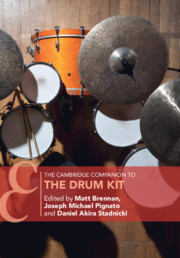Book contents
- The Cambridge Companion to the Drum Kit
- Cambridge Companions to Music
- The Cambridge Companion to the Drum Kit
- Copyright page
- Contents
- Figures
- Tables
- Music Examples
- Notes on Contributors
- Introduction
- Part I Histories of the Drum Kit
- Part II Analysing the Drum Kit in Performance
- Part III Learning, Teaching, and Leading on the Drum Kit
- 10 Studying Hybrid and Electronic Drum Kit Technologies
- 11 The Aesthetics of Timekeeping
- 12 Mentorship
- 13 Leadership
- Part IV Drumming Bodies, Meaning, and Identity
- Index
12 - Mentorship
Jazz Drumming across Generations
from Part III - Learning, Teaching, and Leading on the Drum Kit
Published online by Cambridge University Press: 28 May 2021
- The Cambridge Companion to the Drum Kit
- Cambridge Companions to Music
- The Cambridge Companion to the Drum Kit
- Copyright page
- Contents
- Figures
- Tables
- Music Examples
- Notes on Contributors
- Introduction
- Part I Histories of the Drum Kit
- Part II Analysing the Drum Kit in Performance
- Part III Learning, Teaching, and Leading on the Drum Kit
- 10 Studying Hybrid and Electronic Drum Kit Technologies
- 11 The Aesthetics of Timekeeping
- 12 Mentorship
- 13 Leadership
- Part IV Drumming Bodies, Meaning, and Identity
- Index
Summary
Jazz music has long been understood as a generational practice, one where older musicians mentor, encourage, and teach younger, aspiring players. That tradition of tutelage is evident in the long lineages of musicians who have graduated from the ensembles of noted bandleaders. Historical examples include Duke Ellington, Count Basie, and Art Blakey’s Jazz Messengers. In this chapter, the author considers mentoring as it relates to two drum kit players; Jack DeJohnette, a major figure in the history of jazz drumming and a bandleader recognized for nurturing younger musicians, and Terri Lyne Carrington, a premiere figure in contemporary jazz drumming and a celebrated leader of ensembles that feature young, developing musicians. The chapter is organized according to four broad themes: (a) the importance of mentors; (b) challenges of learning to play the drum kit; (c) the unique place and space of drummers; and (d) ‘something bigger than just the music’. Those themes emerged during a series of interviews with the two participants and in qualitative analysis of the participant thoughts, statements, and expressions.
Keywords
- Type
- Chapter
- Information
- The Cambridge Companion to the Drum Kit , pp. 168 - 180Publisher: Cambridge University PressPrint publication year: 2021

